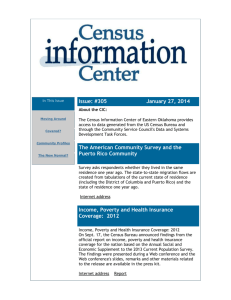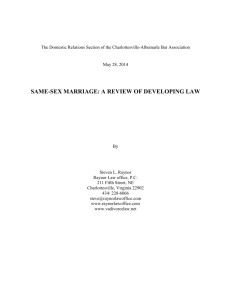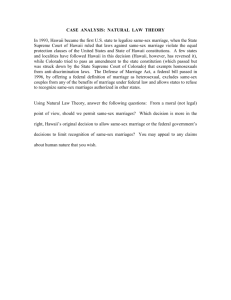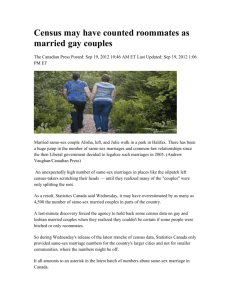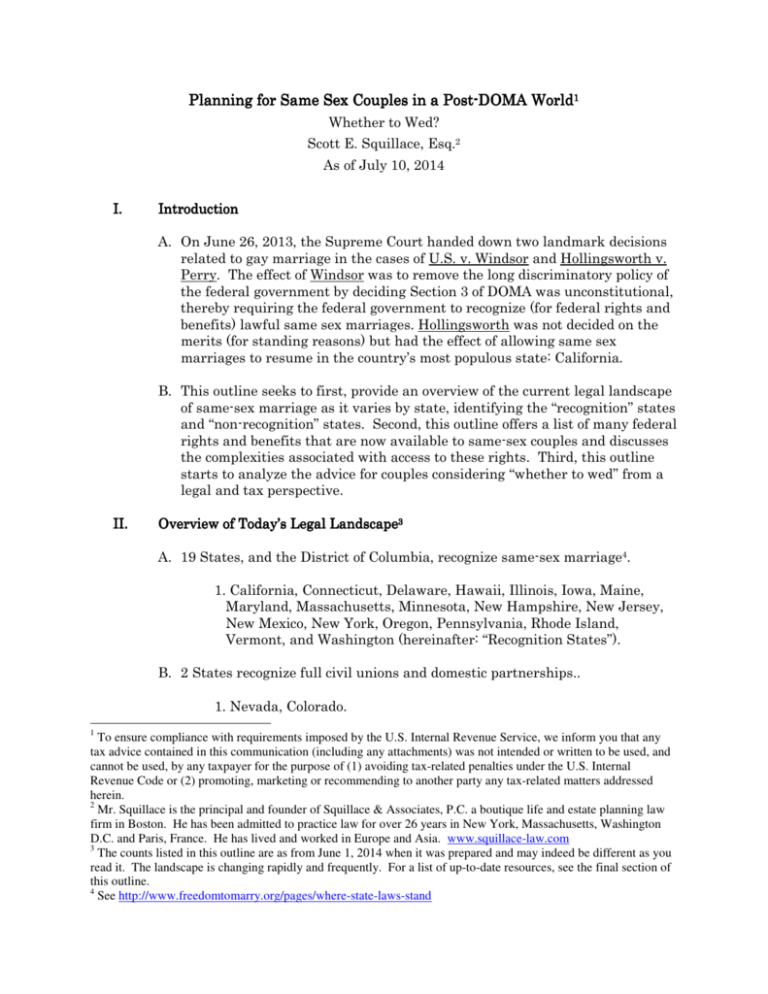
Planning for Same Sex Couples in a PostPost-DOMA World1
Whether to Wed?
Scott E. Squillace, Esq.2
As of July 10, 2014
I.
Introduction
A. On June 26, 2013, the Supreme Court handed down two landmark decisions
related to gay marriage in the cases of U.S. v. Windsor and Hollingsworth v.
Perry. The effect of Windsor was to remove the long discriminatory policy of
the federal government by deciding Section 3 of DOMA was unconstitutional,
thereby requiring the federal government to recognize (for federal rights and
benefits) lawful same sex marriages. Hollingsworth was not decided on the
merits (for standing reasons) but had the effect of allowing same sex
marriages to resume in the country’s most populous state: California.
B. This outline seeks to first, provide an overview of the current legal landscape
of same-sex marriage as it varies by state, identifying the “recognition” states
and “non-recognition” states. Second, this outline offers a list of many federal
rights and benefits that are now available to same-sex couples and discusses
the complexities associated with access to these rights. Third, this outline
starts to analyze the advice for couples considering “whether to wed” from a
legal and tax perspective.
II.
Overview of Today’s Legal Landscape3
A. 19 States, and the District of Columbia, recognize same-sex marriage4.
1. California, Connecticut, Delaware, Hawaii, Illinois, Iowa, Maine,
Maryland, Massachusetts, Minnesota, New Hampshire, New Jersey,
New Mexico, New York, Oregon, Pennsylvania, Rhode Island,
Vermont, and Washington (hereinafter: “Recognition States”).
B. 2 States recognize full civil unions and domestic partnerships..
1. Nevada, Colorado.
1
To ensure compliance with requirements imposed by the U.S. Internal Revenue Service, we inform you that any
tax advice contained in this communication (including any attachments) was not intended or written to be used, and
cannot be used, by any taxpayer for the purpose of (1) avoiding tax-related penalties under the U.S. Internal
Revenue Code or (2) promoting, marketing or recommending to another party any tax-related matters addressed
herein.
2
Mr. Squillace is the principal and founder of Squillace & Associates, P.C. a boutique life and estate planning law
firm in Boston. He has been admitted to practice law for over 26 years in New York, Massachusetts, Washington
D.C. and Paris, France. He has lived and worked in Europe and Asia. www.squillace-law.com
3
The counts listed in this outline are as from June 1, 2014 when it was prepared and may indeed be different as you
read it. The landscape is changing rapidly and frequently. For a list of up-to-date resources, see the final section of
this outline.
4
See http://www.freedomtomarry.org/pages/where-state-laws-stand
Planning for Same-Sex Couples
in a Post-DOMA World
Outline
C. 1 state, Wisconsin, recognizes limited domestic partnerships.
D. “Forced marriage” states, in which a domestic partnership or civil union will
automatically convert to marriage, unless dissolved, include New Hampshire,
Connecticut, Delaware and Washington.
1. Separate status allowed (meaning, the couple can elect to either
become married or remain in a civil union/domestic partnership) in
Vermont and California.
E. 31 States specifically prohibit same-sex marriage5.
1. 28 by state constitutional amendment, 3 by state statute.
F. Interstate recognition: Certain states recognize other states’ validly
performed same-sex relationships6.
1. All Recognition States will recognize other states’ validly performed
same-sex marriages. In addition to marriage recognition, civil unions
and domestic partnerships performed in other states are recognized
by: Washington, Oregon, California, Illinois, Pennsylvania, New York,
Vermont, New Jersey, Massachusetts, and District of Columbia.
2. Nevada will not recognize same-sex marriage but recognizes other
states’ validly performed civil unions and domestic partnerships.
3. Wyoming will recognize other states’ validly performed same-sex
marriages for divorce purposes only; most non-recognition states will
not.
a. There is considerable litigation in many states dealing with the
issue of divorce. See, e.g. Chambers v. Ormiston, 916 A.2d 758
(R.I. 2007) (in which a same-sex couple married in
Massachusetts applied for divorce in Rhode Island, which was
then a Non-Recognition State, and were denied) and In re: J.B.,
326 S.W.3d 654 (Tex. 2010) (in which a same-sex couple,
married in Massachusetts, applied for a divorce in Texas, and
the court ruled they did not have subject matter jurisdiction to
hear the case).
b. Many same-sex couples who have returned to Non-Recognition
States and were not, under their state law, able to become
5
As of July 7, 2014. Information compiled from the Freedom to Marry website, accessed at
http://www.freedomtomarry.org/pages/where-state-laws-stand
6
Information compiled by the Human Rights Campaign, see http://www.hrc.org/campaigns/marriage-center
2
© Copyright 2014 Squillace & Associates, P.C. All rights reserved.
Planning for Same-Sex Couples
in a Post-DOMA World
Outline
divorced have not done so. After Windsor, this may mean they
will still be forcibly married for federal tax purposes.
4. The rest do not provide any interstate relationship recognition.
G. Who’s next? Idaho? Arkansas? Ohio? Others? 7
III.
1,138 Federal Rights & Benefits to Marriage8
A. Availability of federal rights and benefits for same sex married couples now
fall into three categories of federal laws:
1. Definition of “spouse” is determined based on place of marriage, or
“Place of Celebration” (meaning, where the marriage licensed was
issued and the marriage was solemnized).
2. Status of marriage based on domicile at time of application for
benefits, or “Place of Domicile”.
3. Statute and/or regulations are silent on the issue: the “we don’t know
(yet) category”.
B. Place of Celebration Rights: Taxes 9
1. The IRS recently issued Revenue Ruling 2013-17, which declares that
federal rights and benefits for tax matters are available to same sex
married couples according to their “place of celebration”. So, for the
2013 tax year, all legally married same-sex couples will be required to
file their returns together as either “married filing jointly” or “married
filing separately”.
2. Several important issues that arise from this decision include:
a. The marriage penalty – Sometimes, couples may pay less in
federal income tax when one spouse earns much less than the
other or does not work at all. However, high-income couples
with two working spouses will most likely pay more. Every
couple needs to consult their tax advisor and run the numbers.
7
Decisions in several states granting marriage rights to same-sex couples have been stayed pending appeals,
including in Colorado, Utah, Indiana and Kentucky. See http://www.freedomtomarry.org/pages/marriage-rulingsin-the-courts
8
As reported by the General Accounting Office. See U.S. General Accounting Office, Defense of Marriage Act,
GAO/OGC-97-16 (Washington, D.C. January 31, 1997) and U.S. General Accounting Office, Defense of Marriage
Act: Update to Prior Report, GAO-04-353R (Washington, D.C. January 23, 2004).
9
Rev. Ruling 2013-17.Accessible at http://www.irs.gov/pub/irs-drop/rr-13-17.pdf
3
© Copyright 2014 Squillace & Associates, P.C. All rights reserved.
Planning for Same-Sex Couples
in a Post-DOMA World
Outline
b. Ability to amend past returns – If a same-sex married couple
would have received a federal tax refund had they filed a joint
return, they are entitled to claim that money for 3 years from
the date the return was filed or 2 years from the date the tax
was paid, whichever is later. If the couple would have owed
more money, they are under no obligation to repay.
c. Other tax refunds – Same sex married couples are also entitled
to a refund on the income taxes paid for the value of their
spouses’ health insurance coverage, if applicable, since that
was imputed income – now incorrectly.
d. State tax returns – If the same sex married couple lives in a
Recognition State, they are able to file a joint state tax return
as well. If they are living in a Non-Recognition State, the
process is still unclear, and will be much more burdensome.
e. Estate and gift taxes – Married same-sex couples will avoid, or
defer, paying federal estate taxes because spouses can transfer
money and property to each other without federal tax
consequences on an unlimited basis during lifetime and after
death – irrespective of where they are domiciled.
f.
Retirement plans – A same-sex spouse will become the default
beneficiary on all qualified retirement plans. It is still unclear
whether this will be retroactive. Same sex spouses will now
need to consent to naming anyone else as a beneficiary on
ERISA governed plans.
g. Civil unions and domestic partnerships – Civil unions and
domestic partnerships are not viewed the same as marriage by
the federal government, and as a result they cannot file a joint
federal return, even if their state permits them to file jointly. 10
3. A list of the most common federal tax issues includes:
a. Income and Capital Gain Tax
i.
ii.
Joint income tax returns
Offset gains/losses
iii.
Maybe lower marginal rate (but, maybe not)
iv.
Personal Residential Exemption $500k (IRC 121)
v.
Spousal rollover IRAs at death
10
See http://www.nytimes.com/2013/08/31/your-money/gay-marrieds-enter-new-land-of-federaltaxation.html?pagewanted=all&_r=1&
4
© Copyright 2014 Squillace & Associates, P.C. All rights reserved.
Planning for Same-Sex Couples
in a Post-DOMA World
Outline
vi.
vii.
viii.
Section 1031 like-kind exchanges
Joint tenant taxation
Chapter 14 – family attribution rules
b. Transfer Tax Issues
i.
ii.
Intervivos gift exclusions, including gift splitting
Unlimited marital deduction
iii.
Portability
iv.
GSTT
v.
Grantor Trust issues
c. Ability to amend past tax returns (income and estate)
i.
ii.
Three year statute of limitations
But – 9100 Relief - $14,000 to apply.
C. Other Place of Celebration Rights:
1. Military and Veteran’s Benefits
a. On base housing;
b. Shopping privileges
c. Transport and home leave
d. Military healthcare
e. Burial rights
2. Immigration
a. Family Based Immigration Visa
b. US Citizenship based on marriage
3. Employment, Health and Retirement Benefits
a. Federal employee benefits
b. COBRA family benefits
c. FMLA
d. ERISA plan beneficiary designations
e. Health care premiums
5
© Copyright 2014 Squillace & Associates, P.C. All rights reserved.
Planning for Same-Sex Couples
in a Post-DOMA World
Outline
f.
ROTH contribution limits
D. Place of Domicile Rights:
1. Social Security, disability and death benefits
2. Medicaid
E. How the rights will be treated is currently unclear for:
1. Bankruptcy eligibility
2. Real property considerations
3. Capital Gains Tax
4. Garn – St. Germain Act
5. Copyright revision & termination
6. Election contribution limits (FEC)
7. Family attribution rules for securities disclosure (SEC)
8. Ethical rules for disclosures, etc.
IV.
A Complex Matrix of Law
A. Recognition states vs. non-recognition states
B. Place of celebration vs. place of domicile
1. For all recognition states, this is generally a non-issue, provided that
the couple stays living in (and dies in) a recognition state.
2. For non-recognition states, the issue is more complex, since only “place
of celebration” federal rights and benefits can extend to the nonrecognition state (assuming couple is lawfully married in recognition
state or foreign jurisdiction).
V.
Whether to Wed?
A. Putting aside love, commitment, societal, family and religious issues – what
are the legal and tax issues a same-sex couple should consider in making the
decision to marry?
B. The context where this often arises:
6
© Copyright 2014 Squillace & Associates, P.C. All rights reserved.
Planning for Same-Sex Couples
in a Post-DOMA World
Outline
1. Couples in Recognition State who have been together for decades and
chose not to get married previously because there was no federal
recognition of same sex marriage.
2. Couples in Non-Recognition States who believed marriage was merely
a symbolic decision only because no there were no rights or benefits at
the federal or state level if they married in a Recognition State, then
returned to their Non-Recognition State.
C. Weighing the options: Federal rights
1. Pros to Marriage:
a. Taxes
i.
Ability to file jointly on income tax (but watch
community property states and the “marriage penalty”)
ii.
Deductibility of alimony from income in case of divorce
iii.
Ability to transfer money and property to spouse during
life and after death without tax consequences
iv.
v.
Possible tax credits for children of same-sex spouses
Possible tax refunds for past returns and for employer
related health benefits
vi.
Health insurance benefits no longer imputed income
b. Real Estate
i.
Capital gains maximum increased from $5.25 million to
$10.5 million for married couple
ii.
Garn St. Germain Act – Due on Sale Clause
c. Social security, including retirement, disability and SSDI
i.
But only available for same-sex couples living in
Recognition States!
d. Medicaid planning – maybe more strategies available?
e. Private pension/retirement plans
f.
Federal employee benefits
g. Military personnel & veterans benefits
h. Immigration
7
© Copyright 2014 Squillace & Associates, P.C. All rights reserved.
Planning for Same-Sex Couples
in a Post-DOMA World
Outline
i.
Green cards now available for non-citizen same-sex
married couples, but, careful!
i.
Bankruptcy
i.
Spouses can now file jointly, instead of separately, to
save on filing fees
j.
Copyright revision
2. Cons to Marriage:
a. Income Tax (marriage penalty)
b. Medicaid (spousal impoverishment)
c. Family Attribution Rules – IRC
d. Bankruptcy
i.
Married couples can become co-obligors of their spouse’s
debts
e. Student Loan Eligibility
f.
Family attribution for political contributions
g. Family attribution for ethics rules
D. Weighing the options: (Recognition) State rights
1. Pros to Marriage:
a. Inheritance laws, including spousal elective share
b. Spousal privilege for testimony/evidence rules
c. Tort claims for loss of consortium and other claims
d. Workers compensation benefits
e. State estate tax unlimited marital exemption
f.
Health care decisions
g. Family trusts that provide for spouse as beneficiary
2. Cons to Marriage:
a. May need to move to establish residency for divorce
b. Varying adoption and artificial reproductive technology laws
may make building and raising a family difficult, even in
Recognition States
c. Current inability to move to Non-Recognition State and be
entitled to new home state’s rights and benefits
8
© Copyright 2014 Squillace & Associates, P.C. All rights reserved.
Planning for Same-Sex Couples
in a Post-DOMA World
Outline
VI.
Conclusion
A. New regulations and guidance from federal agencies and departments arrive
almost daily to further define what it means for same-sex couples to be
“married” for the purpose of receiving federal benefits. Even with this clarity,
there will undoubtedly be more litigation, some even challenging these
regulations or guidance. For updates, see:
1. GLAD, www.glad.org
2. Human Rights Campaign, www.hrc.org
3. ACLU, www.aclu.org/lgbt-rights
4. Freedom to Marry, www.freedomtomarry.org
5. Tax Equity Project, www.lgbtbar.org/tax-equity-project
6. Family Equality Council, www.familyequality.org
7. Lambda Legal, www.lambdalegal.org
8. National Center for Lesbian Rights, www.nclrights.org
9. Lesbian and Gay Law Notes,
www.nyls.edu/centers/harlan_scholar_centers/justice_action_center/pu
blications/lesbiangay_law_notes
B. To purchase the book Whether to Wed: A Legal and Tax Guide for Gay and
Lesbian Couples by Scott E. Squillace, Esq., visit www.whether-to-wed.com.
Receive a 20% discount by entering “FF20” at checkout (discount valid
through September 30, 2014).
9
© Copyright 2014 Squillace & Associates, P.C. All rights reserved.



